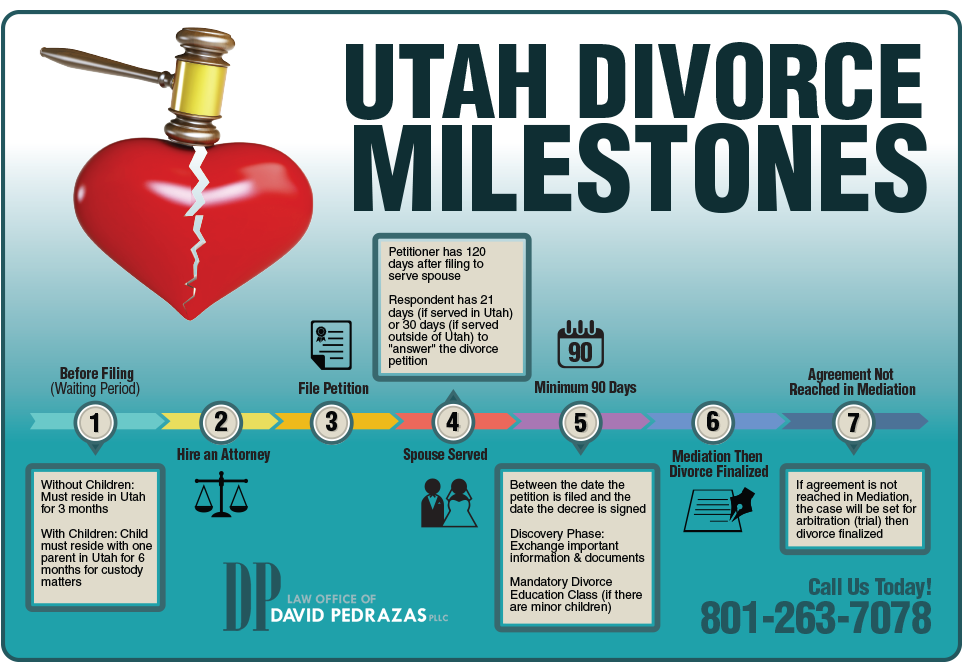What to Do When Served Divorce Papers in Utah
That moment when you’re served divorce papers can take your breath away. While you may want to go hide under the covers until it’s all over, the actions you take now can have a profound impact on your future. These six tips will help you put one foot in front of the other so that you can move forward in your divorce and avoid common pitfalls.
1) Accept the Divorce Papers
Hiding from the papers isn’t likely to change your spouse’s mind and it certainly won’t make the divorce go away. Accept the papers. You have to know what’s going on in order to address the pertinent issues. This is true of all family law cases, including divorce, paternity, or custody modifications.
In the state of Utah, it is possible to receive service through a sheriff service, or through the mail. Even if you don’t read the papers, your spouse will have “Proof of Service” from the postal service as long as the documents were sent via registered or certified mail, and you signed for the delivery. If anyone else signs for the papers on your behalf, the papers are not considered “served” in Utah courts.
2) Do Not Break the Summons Restraining Orders
Your divorce summons will contain automatic restraining orders preventing you from taking specific actions until the divorce has been finalized. Failing to follow the restraining order can result in contempt proceedings and other penalties. It’s not worth the risk.
Some of the things included in the restraining order include:
- Transferring assets
- Changing insurance beneficiaries
- Changing/ Canceling health insurance
- Closing accounts
- Canceling credit cards
Doing these things is frowned upon by the courts and can even land you in trouble; so avoid doing so for as long as the restraining orders are in place. Don’t let the automatic restraining orders deter you. It is possible to get temporary orders for things such as custody, alimony, and child support before a divorce is finalized.
3) Take Note of Deadlines

The paperwork you receive may include one or more of the following:
- Complaint for divorce
- Automatic restraining order
- Summons
- Motion for temporary orders
- Notice of date for temporary orders
- Tracking sheet
4) Deal with Your Emotions
Dealing with your emotions is often the difficult part. You may want to throw something, to cry, to scream, or just to go to bed – and stay there – until next winter. Unfortunately, you do not have the luxury of a lot of time on your hands to plan for the changes in store over the next month. So, you need to draw on your own personal support network of people you trust to help you get through these tough times.
No matter how much you’re hurting, it is critical that you avoid involving your children. They’re hurting enough on their own and they are still trying to protect you while dealing with their own feelings of pain, love, and confusion. For the sake of everyone involved, consider getting counseling for yourself and for your children as you all try to cope with your emotions and the divorce.
5) Get Your Financials in Line
Money is a big deal in divorce. Do you earn enough to support yourself and your children on your own? Will the divorce create a financial hardship for you? For women and children in the U.S., divorce is one of the leading causes of poverty.
If you’re unsure of how you’re going to support yourself after a divorce, it’s time to take a long hard look at your finances. Gather all the relevant data, make copies of financial documents, check all accounts – make sure your spouse hasn’t charged, withdrawn, or closed accounts. Make sure you know where you’re starting, financially, so you can decide where to go from there. If possible, it’s a good idea to consult with an accountant.
6) Hire an Experienced Utah Divorce Attorney
This is one of the most important decisions you can make after receiving divorce papers. Your Utah divorce attorney can help you with a wide range of divorce-related issues including filing counterclaims asserting your rights and requests for relief. They can help you complete your financial statements, including expense sheets and a three year financial history, to prepare for temporary hearings and prepare a guideline for child support.
While it may feel like a catastrophic blow to the life you had once planned out for yourself, being served divorce papers doesn’t bring your life to an end. By taking swift, calculated actions immediately after receiving your divorce papers, you can position yourself for a much more favorable result. Don’t allow your deadline to pass without making an appropriate response to your divorce summons. Call the Law Office of David Pedrazas, PLLC, and let us help you with this critical task.
Related Posts:
What to Do When Served Divorce Papers in Utah?
How to Serve Divorce Papers in Utah
How to Serve Your Spouse Divorce Papers Under Special Circumstances

